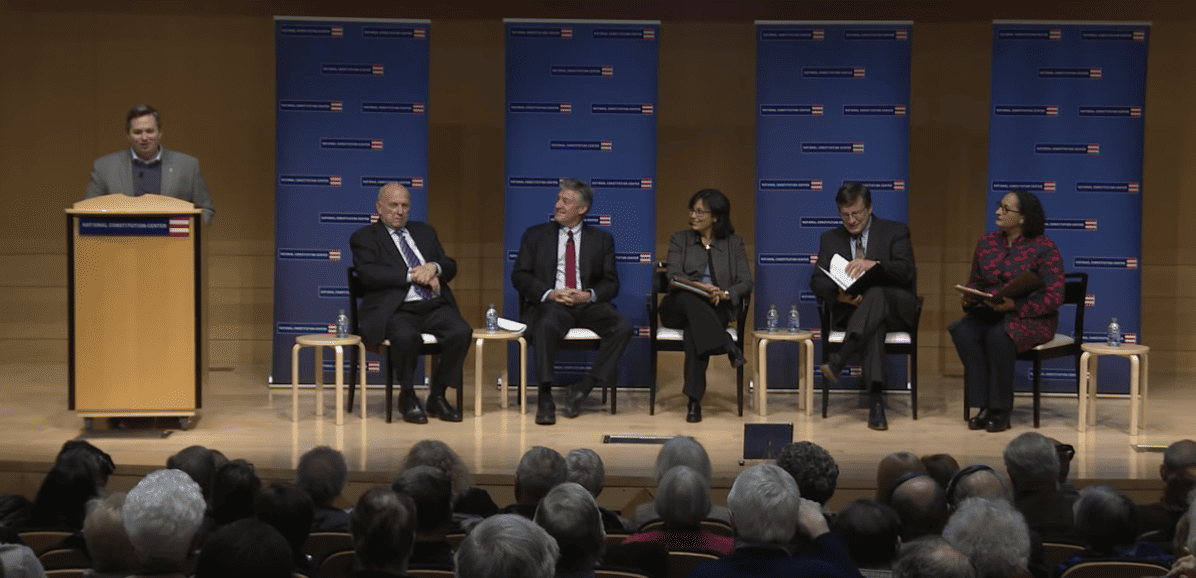Should we amend the Constitution to authorize political spending limits? That question was the subject of a recent debate between American Promise President Jeff Clements, business leader Elizabeth Doty and two incredibly qualified opponents—read our arguments for why the answer is “yes.”
This issue lies at the heart of our work at American Promise, as we build support across the country for the 28th Amendment to ensure rights for people over privileges for corporations and special interests.
What does the First Amendment promise our nation? Are free speech and political spending equivalent? Where do the free speech rights of citizens conflict with the free speech rights of corporations—and what’s the solution? Recently Jeff Clements, president and founder of American Promise, advocated for the 28th Amendment at a debate around the fundamental future of our nation at the site of our genesis, the National Constitution Center in Philadelphia.
Jeff was joined by fellow 28th Amendment advocate Elizabeth Doty, business leader and co-founder of the American Promise Bay Area Business Council. Their arguments were opposed by their esteemed opponents: Bradley Smith, former chairman of the FEC and founder of the Institute of Free Speech, and Floyd Abrams, Senior Counsel at Cahill Gordon & Reindel.
What follows is a summary of highlights from the hourlong debate that also reflect the mission behind American Promise.
The debate was hosted by American Promise, the American Constitution Society and the National Constitution Center in Philadelphia.
Moderator Ciara Torres-Spelliscy, Fellow at the Brennan Center for Justice, set the stage for the debate, noting that the U.S. Constitution can be frustrating for those in the legal profession because it doesn’t clearly address a lot of modern problems, including money in politics. “Against that silence in the text, the Congress and the states have passed a series of campaign finance laws that try to address the issue of money in politics,” she said. When these laws are challenged, courts typically turn to the First Amendment and cite its text when they equate freedom of speech with freedom of political spending.
Two U.S. Supreme Court rulings opened the door for higher campaign spending and elections influenced by outside funding: Buckley v. Valeo, from 1976, and Citizens United in 2010. The 28th Amendment aims to counter that by instituting political spending limits on individuals and corporations.
During the debate, Jeff and Elizabeth highlighted four elements of the Citizens United ruling and why each reveals a need for political spending limits in the 28th Amendment:
Is money speech?
In its ruling, the Supreme Court argued that because money is necessary for speech, limiting money amounts to limiting free speech. During the debate, Bradley and Floyd said that spending limits in the 28th Amendment would restrict rather than enhance political participation and limit speech.
Our view: As Elizabeth said, “Viewing money this way corrupts the idea of equal representation and allows some to amplify their voices and drown out others in elections and in day-to-day governing.” The current system creates a political system so dependent on money that members of Congress prioritize it: Elizabeth noted that the average U.S. representative devotes 30 to 70 percent of her time to campaign fundraising.
Should corporations of all types, as collections of individuals, have a right to spend as much as they want to influence our political processes?
In Citizens United, the Supreme Court said that people should not be stripped of their rights just because they associate in corporate form—such as unions, nonprofits, trade associations and for-profit companies. Bradley questioned how the spending limits would be determined and cautioned against the dangers of government decision-making: “It’s not going to empower the people, it’s going to empower the politicians,” he said.
Our view: A corporation, especially a for-profit company, is not an association of people. “Unlimited political spending promotes crony capitalism and undermines long-term prosperity,” Elizabeth said. “Under crony capitalism, companies compete by buying political influence” and use this to stifle political debate.
Does independent spending prevent political corruption?
Floyd warned that giving the government control of spending limits through the 28th Amendment would endanger personal rights. “We deal in an area in which people in power have enormous impetus to pass legislation limiting people out of power from talking,” he said. He also noted that the United States is a large country where people spend a lot of money on a lot of things, and political spending is just one of them.
Our view: This doesn’t hold up in practice, Jeff said, noting that political spending is different than everyday spending on things such as groceries and clothing. “The problem is the money is concentrated,” he said, as less than 1 percent of Americans contribute most of the money in the U.S. political system. “Politicians and candidates know the power of this money,” he said, noting fossil fuel corporations are among the big spenders, and politicians are hesitant to discuss climate issues because of this influence. This silences public debate and stalls policy changes, he said: “We need to rescue the First Amendment, we need to rescue our politicians, so we can have more debate, more ideas and more solutions.” Incumbents and political party leaders are in the dominant position to demand money, punish those who don’t play, and reward those who can pay for favorable policy, Jeff said, noting that most PAC funding goes to incumbents and 40 percent of state legislative races across the country are uncontested.
Is political equality part of the First Amendment?
The 28th Amendment would empower the politicians, Bradley argued, who would use it to reduce criticism. He said “outside spending” is spending by the people—any kind of group that engages in political discussion. “If we think democracy is truly threatened, then we want to spend our money to voice that opinion,” he said.
Our view: “Under this new theory, your equal rights do not matter,” Jeff said. To counter this legal interpretation and “save the First Amendment,” he said the 28th Amendment would restore political equality, which is central to the First Amendment. “My right to have free speech and your right to have free speech is because we’re both equal citizens,” he said. “I’m not allowed to shout you down because you have an equal right to free speech as well.” Jeff added: “The court’s removal of equality from the First Amendment is the most efficient, most effective way to rapidly allocate political power based on wealth in this country, and that’s exactly what’s happened. The Supreme Court isn’t going to fix it. Only we can fix it with an amendment.”







